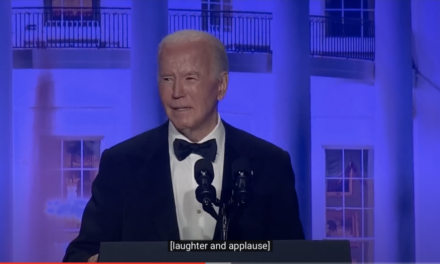We support our Publishers and Content Creators. You can view this story on their website by CLICKING HERE.
NPR is biased in favor of leftists and the Democrat Party. Unless you’ve been living under a rock, this is not exactly news. Even former NPR Business Editor Uri Berliner, whose April 9 op-ed in The Free Press shed new light on the incredibly disproportionate left-wing bias of the outlet, had to admit that in 2011, liberals accounted for a significantly larger amount of audience share.
A 2010 study by the Pew Research Center for People and the Press in turn reported that 61 percent of NPR listeners described themselves as progressive, while a piece in the not-exactly-conservative publication The Nation described NPR as promoting a “lifestyle smugness” of “confident dispatches from the East Coast citadels of cultural consensus.”
No, what’s interesting about the NPR scandal is not Berliner’s exposé — which in short order led to his resignation following disciplinary action from his employer — but the response from NPR CEO Katherine Maher, who represents what is wrong with the technocratic class governing our elite institutions. In her milquetoast response to Berliner’s missive attacking NPR — which has renewed calls for defunding a media outlet that is partially funded by taxpayer dollars — Maher exposes the ideological narrowness and intellectual rot of our elite class.
Epitome of the Self-Serving Woke Technocrat
In an April 12 open letter Maher sent to NPR staff, she declared that “public media is essential for an informed public” and that “we succeed through our diversity.” She celebrated having “earned new trust from younger, more diverse audiences.” In other words, she parroted the language of the quintessential schoolmarmish and therapeutic HR commissar who relies on the empty platitudes of the proceduralist woke workplace to obscure what is, in fact, a patently intolerant, un-diverse professional environment that coerces employees into ideological conformity. Those who resist that leftist project risk disciplinary action or termination.
Maher’s talk of diversity and professional decorum is subverted by her own divisive, radical political opinions. In May 2020 on her X (formerly Twitter) page, she acknowledged that while “looting is counterproductive,” it was “hard to be mad about protests not prioritizing the private property of a system of oppression founded on treating people’s ancestors as private property.”
In June 2020, she declared: “White silence is complicity,” and, “If you are White, today is the day to start a conversation in your community.” She described herself “as someone with cis white mobility privilege.” Unsurprisingly, she supports racial reparations.
In sum, Maher is a caricature of the successful white female professional who employs an endless supply of woke racialist rhetoric to cynically distract from the obvious fact that she herself is a product of the very same “oppressive power structures” she so vehemently condemns. That self-serving play-acting of “rules for thee but not for me” is perhaps required given she is, after all, the daughter of a Goldman Sachs executive and Connecticut state senator, graduated from New York University, and worked for HSBC.
“She’s a ‘Portlandia’ character,” observed Bill Maher. “I mean it’s [a] kind of White woman who says she’s Beyoncé’s spirit animal.”
The Problem Is Leftists Don’t See a Problem
The bigger problem, however, is that Katherine Maher — and so many others in her cohort — don’t even see the problem of the ideological conformity their institutions have coercively created. Whether explicitly or implicitly, the form of self-reflection and contrition they’ve learned is a performative self-critical rhetoric manifested in such admissions as Maher’s “cis white mobility privilege.”
It is encapsulated in the suburban and gentrified urban displays of BLM and “In This House We Believe” flags that serve as mechanisms of both self-congratulation and self-preservation: “Don’t blame us upper-middle white people, blame those other bigoted, backward white people.” It reaches its apotheosis in such people as Robin DiAngelo, the snake oil saleswoman who makes millions off helping the gullible (or, in many cases, the shrewd) shed their “white fragility” by offering the perfunctory statements of self-hatred while keeping their jobs and bank accounts.
Schooled to believe that opinions that don’t conform to leftist ideology are unworthy of consideration — and may even be “harmful” and “violent” — it’s near impossible for woke technocrats to concede that the institutions most intended to ensure freedom of speech are as narrow-minded and intolerant as the ideologies they were created to combat.
Consider Washington Post Columnist Perry Bacon, who in an April 8 op-ed argued, “Democratic officials and the broader left generally support America’s long-standing system of universities that operate largely independently from partisan politics.” He continued: “The overwhelming majority of American students attend public colleges that don’t have intense left- or right-wing activism.” Who, in the face of antisemitic, pro-terrorism rallies across American campuses could claim with a straight face that academia operates independently of partisan politics?
Defunding NPR Might Send a Message
In the face of Berliner’s devastating essay slamming NPR for its blatant leftist bias, calls have once again arisen — as they have since the 1990s — to defund NPR. Doing so would make little difference to the federal budget; only about $126 million in taxpayer funds is doled out to public radio stations, effectively a rounding error. And given that’s only a fraction of public radio’s budget, it’s likely the organization would carry on, perhaps, as an act of protest, shored up or even expanded via the largesse of eager, wealthy lefty donors.
Nevertheless, defunding NPR would certainly send a message: that there remain a few ways for representative government to push back against the smug authoritarianism of our unelected ruling class. Perhaps, as some writers have opined, the fact that NPR’s failures are featured so promptly in the news will give sufficient momentum to this pet Republican cause. But given Congress’s continued anemic efforts on everything from abortion to our border crisis, I wouldn’t put too much faith in that effort.
As many conservatives have already learned, it will be largely up to individual Americans in their families, communities, and support networks to take effective action to build and support the kind of America that NPR CEO Katherine Maher so vocally detests.
Casey Chalk is a senior contributor at The Federalist and an editor and columnist at The New Oxford Review. He has a bachelor’s in history and master’s in teaching from the University of Virginia and a master’s in theology from Christendom College. He is the author of The Persecuted: True Stories of Courageous Christians Living Their Faith in Muslim Lands.

 Conservative
Conservative  Search
Search Trending
Trending Current News
Current News 





